2018中考英语易混短语辨析
2018年中考英语语法必考知识点总结

2018年中考英语语法必考知识点总结句子成分:主语、谓语、宾语、表语、定语、宾语补足语和状语1、主语:(1)由名词、代词(人称代词用主格)、动词不定式、动名词等充当,说明动作是“谁”发出的。
如:The painter painted a very nice picture. (画家画了一幅漂亮的画。
) / They fought against SARS bravely. (他们勇敢地与非典搏斗。
) / To see is to believe. (耳听为虚眼见为实). / Helping animals is to help people. (帮助动物就是帮助人类。
)(2)动词不定式或动名词做主语时可用it代替,而不定式或动名词移至表语或宾语之后。
如:It is very comfortable to have a Class A seat during the long journey.(在长途旅行中能有个甲等座位简直太舒服了。
) / Eating too much is bad foryour health.(=It is bad for your health eating too much.) (吃得太多对你的身体不利。
)(3)口语中常见主语或“主--系”省略:(It is) nothing. ((那)没有什么。
)/ (It)doesn’t matter. ((那)没有关系。
) / (I) thank you. ((我)谢谢你。
)(4)反意问句的附加问句,主语必须是代词:The man looks worried,doesn’t he? (这个人看上去很着急不是吗?) / Tigers are dangerous animals, aren’t they? (老虎是危险的动物不是吗?)(5)祈使句一般省略主语。
加主语时往往用来指定某个人。
Keep the keyboards clean,children. (孩子们请保持键盘的清洁。
中考英语重要短语的用法及区别:across,cross,crossing,through,past
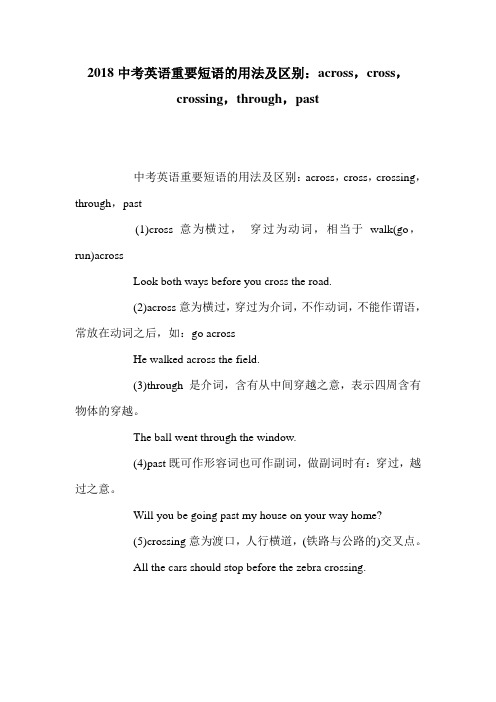
2018中考英语重要短语的用法及区别:across,cross,
crossing,through,past
中考英语重要短语的用法及区别:across,cross,crossing,through,past
(1)cross 意为横过,穿过为动词,相当于walk(go,run)across
Look both ways before you cross the road.
(2)across意为横过,穿过为介词,不作动词,不能作谓语,常放在动词之后,如:go across
He walked across the field.
(3)through 是介词,含有从中间穿越之意,表示四周含有物体的穿越。
The ball went through the window.
(4)past既可作形容词也可作副词,做副词时有:穿过,越过之意。
Will you be going past my house on your way home?
(5)crossing意为渡口,人行横道,(铁路与公路的)交叉点。
All the cars should stop before the zebra crossing.。
初中英语常考易混短语详解

初中英语常考易混短语详解
在我们的教学中发现同学们在学习英语的过程中遇到过哪些自认为比较难以理解的内容,或者哪一块的内容是在平时完全可以理解,但在考试的时候却总是出错的。
我们发现初中生们往往对一些介词的用法不是很能理解,比如什么时候用“in”,什么时候用“on”,完全抓不住规律;除此之外还有一些“长得比较像”的短语经常会用错。
对于这一块要么是因为自己粗心大意,要么就是完全没有掌握这些短语的性质。
针对这些问题,我们给学生的建议是首先一定要完全弄懂他们的性质,其次在将这些相似的短语进行比较的时候要能分辨出他们分别能运用在哪些语境中,能修饰的是可数名词还是不可数名词,还是一个能修饰名词一个只能修饰动词。
初中英语的学习往往也是一个积累的过程,在记单词、学语法的同时,还要学会整理归纳。
那么今天我们分享给大家的就是初中英语中最常考且最易混淆的20个短语,并举例说明他们之间的不同之处。
希望能学生们在今后的考试中避免再次出错。
整理出这20个易错短语,并不是希望学生将其死记硬背下来,之所以举例子加以说明是希望学生们能在理解的基础上真正弄清楚他们的性质用法,避免再在考试中出错。
中考英语重点易混淆短语总结精华(推荐)
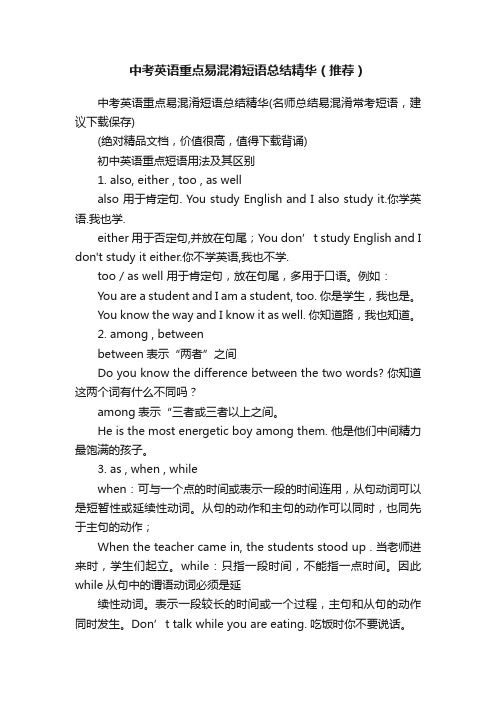
中考英语重点易混淆短语总结精华(推荐)中考英语重点易混淆短语总结精华(名师总结易混淆常考短语,建议下载保存)(绝对精品文档,价值很高,值得下载背诵)初中英语重点短语用法及其区别1. also, either , too , as wellalso 用于肯定句. You study English and I also study it.你学英语.我也学.either 用于否定句,并放在句尾;You don’t study English and I don't study it either.你不学英语,我也不学.too / as well 用于肯定句,放在句尾,多用于口语。
例如:You are a student and I am a student, too. 你是学生,我也是。
You know the way and I know it as well. 你知道路,我也知道。
2. among , betweenbetween表示“两者”之间Do you know the difference between the two words? 你知道这两个词有什么不同吗?among表示“三者或三者以上之间。
He is the most energetic boy among them. 他是他们中间精力最饱满的孩子。
3. as , when , whilewhen:可与一个点的时间或表示一段的时间连用,从句动词可以是短暂性或延续性动词。
从句的动作和主句的动作可以同时,也同先于主句的动作;When the teacher came in, the students stood up . 当老师进来时,学生们起立。
while:只指一段时间,不能指一点时间。
因此while从句中的谓语动词必须是延续性动词。
表示一段较长的时间或一个过程,主句和从句的动作同时发生。
Don’t talk while you are eating. 吃饭时你不要说话。
初中英语中考常用介词短语和易混易错词组
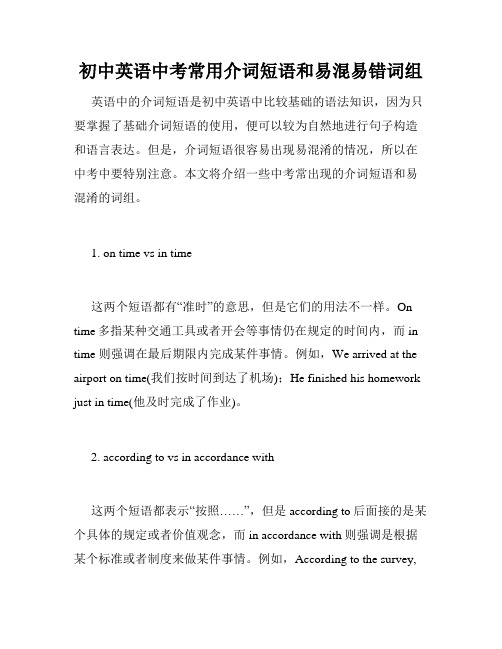
初中英语中考常用介词短语和易混易错词组英语中的介词短语是初中英语中比较基础的语法知识,因为只要掌握了基础介词短语的使用,便可以较为自然地进行句子构造和语言表达。
但是,介词短语很容易出现易混淆的情况,所以在中考中要特别注意。
本文将介绍一些中考常出现的介词短语和易混淆的词组。
1. on time vs in time这两个短语都有“准时”的意思,但是它们的用法不一样。
On time多指某种交通工具或者开会等事情仍在规定的时间内,而in time 则强调在最后期限内完成某件事情。
例如,We arrived at the airport on time(我们按时间到达了机场);He finished his homework just in time(他及时完成了作业)。
2. according to vs in accordance with这两个短语都表示“按照……”,但是according to后面接的是某个具体的规定或者价值观念,而in accordance with则强调是根据某个标准或者制度来做某件事情。
例如,According to the survey,more and more people prefer to work from home(根据调查,越来越多的人喜欢在家工作); In accordance with company regulations, smokers may only smoke in designated areas(根据公司规定,吸烟者只能在指定区域吸烟)。
3. in spite of vs despite这两个短语都表示“尽管”,但in spite of通常用来表示困难或者阻力,而despite则强调不受阻碍的情况。
例如,In spite of the heavy rain, we still went hiking(尽管下着大雨,我们还是去远足了);Despite the fact that he was tired, he continued to work(尽管很累,他还是继续工作)。
中考英语易混词组经典辨析
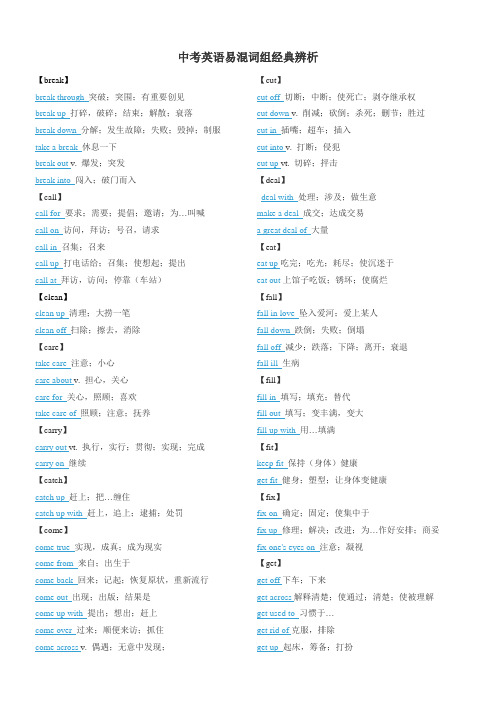
中考英语易混词组经典辨析【break】break through 突破;突围;有重要创见break up 打碎,破碎;结束;解散;衰落break down 分解;发生故障;失败;毁掉;制服take a break 休息一下break out v. 爆发;突发break into 闯入;破门而入【call】call for 要求;需要;提倡;邀请;为…叫喊call on 访问,拜访;号召,请求call in 召集;召来call up 打电话给;召集;使想起;提出call at 拜访,访问;停靠(车站)【clean】clean up 清理;大捞一笔clean off 扫除;擦去,消除【care】take care 注意;小心care about v. 担心,关心care for 关心,照顾;喜欢take care of 照顾;注意;抚养【carry】carry out vt. 执行,实行;贯彻;实现;完成carry on 继续【catch】catch up 赶上;把…缠住catch up with 赶上,追上;逮捕;处罚【come】come true 实现,成真;成为现实come from 来自;出生于come back 回来;记起;恢复原状,重新流行come out 出现;出版;结果是come up with 提出;想出;赶上come over 过来;顺便来访;抓住come across v. 偶遇;无意中发现;【cut】cut off 切断;中断;使死亡;剥夺继承权cut down v. 削减;砍倒;杀死;删节;胜过cut in 插嘴;超车;插入cut into v. 打断;侵犯cut up vt. 切碎;抨击【deal】deal with 处理;涉及;做生意make a deal 成交;达成交易a great deal of 大量【eat】eat up吃完;吃光;耗尽;使沉迷于eat out上馆子吃饭;锈坏;使腐烂【fall】fall in love 坠入爱河;爱上某人fall down 跌倒;失败;倒塌fall off 减少;跌落;下降;离开;衰退fall ill 生病【fill】fill in 填写;填充;替代fill out 填写;变丰满,变大fill up with 用…填满【fit】keep fit 保持(身体)健康get fit 健身;塑型;让身体变健康【fix】fix on 确定;固定;使集中于fix up 修理;解决;改进;为…作好安排;商妥fix one's eyes on 注意;凝视【get】get off下车;下来get across解释清楚;使通过;清楚;使被理解get used to 习惯于…get rid of克服,排除get up 起床,筹备;打扮get on 上车,上马;进展,使前进get out of 逃避;避免get through 通过;到达;做完;接通电话get away 离开;逃脱;出发【give】give up放弃;停止;投降;使埋头于give away 放弃;泄露;分发;出卖give out 分发,发出;公布,发表;用尽,精疲力竭give in v. 屈服;让步;交上give off 发出(光等);长出(枝、杈等)【go】go ahead开始;前进;先走;干吧go up上升;上涨;增长;建起go on 继续;过去;继续下去;发生go on with继续;进行;暂时使用go on well with与某人相处融洽=get on withgo out of从…出来,离开go away走开go through参加;经受;仔细检查;被通过go over复习,重温;仔细检查;转变;润色go by经过;顺便走访;凭…判断【hand】hand out分发;施舍;把…拿出来hand over 交出;移交hand up举手;呈交上级hand in 交上;提交;呈送on the one hand…on the other hand 一方面……另一方面……shake hands 握手【hang】hang out 挂出;闲逛hang up 挂断电话;搁置,拖延【help】help out 帮助…摆脱困难help with 帮忙某人做…help oneself 自用;自取所需with the help of 在…的帮助下help each other 互相帮助couldn't help doing 禁不住;不得不ask for help 寻求帮助;求助;请求帮助with one's help 在某人的帮助下【keep】keep on 继续;穿着…不脱keep up with 赶得上;和…保持联系keep in mind 记住keep in touch 保持联络keep in touch with 与…保持联系keep away from 远离,回避keep healthy 保持健康keep an eye on v. 照看;留意;密切注视keep moving 继续前进【laugh】laugh at 嘲笑;have a good laugh 笑得好开心【learn】learn from意思是听到获悉,向…学习,了解,learn about是学习某方面的知识learn by oneself 自学learn of 听说,听到;获悉learn to do 做事;学会做某事;学习做…learn by heart 记住;默记;背诵learn and live 活到老学到老;学无止境【leave】leave for 动身去leave out 遗漏,省去;不考虑on leave 休假;在休假中【let】let out放掉;发出;放走;放出let alone更不用说;更别提;不干涉;不打扰let down使失望;降低;放低;放衣服let in放进;让...进入;进入;……【Look】look about /around环顾四周look after照顾,照看,照料,关心=take care oflook at 看……,注视……look back回顾,回想=think backlook down on /upon 看不起,瞧不起look for寻找look forward to v-ing 期待,盼望look into调查,研究,了解。
中考英语之易混淆词汇知识点辨析
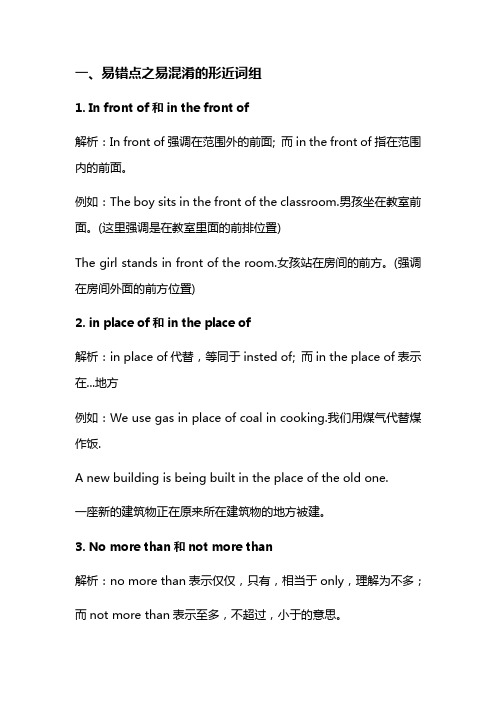
一、易错点之易混淆的形近词组1.In front of和in the front of解析:In front of强调在范围外的前面; 而in the front of指在范围内的前面。
例如:The boy sits in the front of the classroom.男孩坐在教室前面。
(这里强调是在教室里面的前排位置)The girl stands in front of the room.女孩站在房间的前方。
(强调在房间外面的前方位置)2.in place of和in the place of解析:in place of代替,等同于insted of; 而in the place of表示在...地方例如:We use gas in place of coal in cooking.我们用煤气代替煤作饭.A new building is being built in the place of the old one.一座新的建筑物正在原来所在建筑物的地方被建。
3.No more than和not more than解析:no more than表示仅仅,只有,相当于only,理解为不多;而not more than表示至多,不超过,小于的意思。
例如:He is no more than an ordinary English teacher. 他只不过是个普通的英文老师。
He has not more than three children. 他最多3 个孩子(有或许还不到三个)4.On earth和on the earth解析:两者都有在地上,在地球上的意思,但on earth还有到底,究竟的意思;On the earth只是单纯的表示在地上,在地球上例如:where on earth did you spring from?你究竟从哪里冒出来的?What if there was no lead on the earth at all?如果地球上根本就没有铅这种物质怎么办?5.At all和after all解析:at all表示根本,全然的意思,常用短语not at all表示一点也不;after all表示到底,毕竟的意思例如:I don't know him at all. 我根本不认识他。
2018中考英语:必背短语辨析20组

2018中考英语:必背短语辨析20组2018中考英语:必背短语辨析20组中考英语必背词语辨析20组词语辨析集中在对实词,即对名词动词、形容词、副词等的考查,主要考查同义、近义、形近词汇的辨析以及词组与习惯用法的辨析。
1、after, in这两个介词都可以表示“……(时间)以后”的意思?after 以过去为起点,表示过去一段时间之后,常用于过去时态的句子中?如:She went adays。
她是三天以后走的?in 以现在为起点,表将来一段时间以后,常用于将来时态的句子中?如:She will gdays。
她三天以后要走?2、how long, how often, how soonhow long指多长时间,主要用来对一段时间(如three days, four weeks 等)提问?如:How long ago was it? 这是多久前的事了?how often指每隔多久,主要用来对频率副词或状语(如once a week等)提问?如:—How often d? —Once a month。
他(每隔)多久来一次?每月一次?how soon指再过多久,主要用来对表示将来的一段时间(in an hour, in two weeks 等)提问?如:How sooncan you come? 你多快能赶来?3、few, a few, little, a little, several,somefew 和little的意思是否定的,表示“很少”或“几乎没有”;而a few和a little的意思是肯定的,表示“有一些,有一点儿”?few 和 a few修饰可数名词;little 和 a little 修饰不可数名词?several用于修饰可数名词,语意比a few和some 更肯定,含有“好几个”的意思?some可修饰可数名词,也可修饰不可数名词,从数量上说,它有时相当于a few 或 a little,有时指更多一些的数量?4、, another指两个人或事物中的“另一个”,表示特指?如:We stooddad andd。
- 1、下载文档前请自行甄别文档内容的完整性,平台不提供额外的编辑、内容补充、找答案等附加服务。
- 2、"仅部分预览"的文档,不可在线预览部分如存在完整性等问题,可反馈申请退款(可完整预览的文档不适用该条件!)。
- 3、如文档侵犯您的权益,请联系客服反馈,我们会尽快为您处理(人工客服工作时间:9:00-18:30)。
2018中考易混短语辨析1.do morning exercises 做早操do eye exercises做眼保健操do exercise 做运动do exercises做练习2.be good at sth/doing sth 擅长做某事do well in sth/doing sth 擅长做某事be weak in sth/doing sth 在某方面薄弱work hard at sth 勤奋学习。
3.because + 句子because of sth / doing sth 因为。
4.one… the other…一个…….另一个…others = other + 名次复数another (众多当中的)另一个5.dress up 乔装打扮dress up as乔装打扮成……dress sb 给某人穿衣be dressed in + 服装穿。
衣服put on + 服装wear + 服装be in + 服装have …on + 服装6.hear from sb = receive one’ s letter 收到某人来信hear of/about sb听说过某人7.how many + 可数名词复数how much + 不可数名词或者指询问价格how often = how many times + 段时间多久一次(对频率提问)how long 多长时间(对段时间提问)how soon 多快(in + 段时间)how far 多远8.cost 东西做主语,值多少钱sth cost sb somemoneyspend 人做主语花钱,或者花时间I spend 5yuan on the book. / I spend 5 yuan in buying the book,pay人做主语I paid 5 yuan for the book.take It takes sb some time to do sth9.plenty of + 可数名次/ 不可数名词a number of + 可数名词a great deal of + 不可数名词10.Women’s Day / Children’s DayTeacher s’ Day / Teacher s’ office / the teacher’s deskMother’s Day / Father’s Day11.feel lonely 感觉孤单live in a lonely house住在一个偏僻的房子里live alone / by oneself / on one’s own 独自居住12.at the same time 同时at times / from time to time / sometimes有时sometime 某时some time一段时间at a time一次13.fall off sp 从……摔下fall down 摔倒fall into 掉进……fall over 摔倒fall behind 落后fall onto 掉在……上14.be famous for sth / doing sth 因为……而闻名be famous as +身份作为……身份而闻名be famous to 对……来说很出名15.pay for sth 为某物付钱pay sb some money 付钱给某人16.put up a poster 张贴海报put up your hand举手put up a tent 搭建一个帐篷put away your things 收拾好你的东西put out the fire 扑灭大火put off the meeting 推迟会议put down your hand放下你的手17.sleep with one’s eye open wide眼睛睁着大大地睡觉be widely used 被广泛使用a wide river 一条宽阔的河18. All right. 好的That’s all right. 不用谢。
没关系。
That’s right. 那是正确的。
19.be made of + 材料由……制成(看得出材料)be made from + 材料由……制成(看不出材料)be made by + 制作者由……制造be made in sp 在某地制造be made into +成品被制成……20.grow up 长大grow into 长成……grow well 长得好grow rice 种植水稻1.“花费”的用法:spend,pay,cost,takeSb. spend …on sth. /(in) doing sth.某人花了(时间、金钱)做某事。
Sb. pay…for sth. 某人为某物花了…钱。
Sth. cost sb. …某物花了某人…钱。
It takes/took sb…to do sth.花了某人(时间做某事2.too much, too many, much tootoo much + 不可数名词/too many + 可数名词/much too + 形/副3.must, have tomust表示说话人的主观看法;而have to则表示客观需要。
mustn’t意为"不可以;不允许";don’t have to意为"不必"。
4.another, the other, other, the othersanother是三者三者以上的“另一个”;the other是指两个中的“另一个”。
other+名词复数the others= the other +名词复数5.few, a few; little , a little. “少”few, a few+可数名词/little, a little+不可数名词。
a few, a little肯定,few, little否定。
7.say , tell,speak , talk “说”say指用语言表达自己的思想,着重所说的内容。
它的宾语只能是“话”,不是“人”;tell是告诉某人一件事。
用于tell sb. about sth.; speak的意思是“说话”,着重说的动作,是不及物动词;也做“演说”解,此外可作及物动词用,接语言等词。
电话时,习惯用speak;talk的意思是“谈话”。
通过谈话交换意见,思想等,是不及物动词。
talk to sb. about sth.8. how long, how often, how far, how soonhow long意为“多久、多长时间”,主要是对一段时间进行提问,答语通常是(for+时间段)它可用于各种时态; how often意为“多久……次”,用就频率提问;how far意为“多远”,对距离提问;how soon意为“还要多久”,常用在一般将来时态的句子中,其答语通常是“in + 一段时间”。
9.either, either…or, neither, neither…nor, both …andeither "两者中的任何一个"Either也否定句中“也”;either...or...意为"或者…或者…;不是…就是…"表示两者之一,连接句子中两个并列的成分;either...or...连接两个主语时,"就近原则";neither作主语,表示"两者中没有一个"; neither...nor...表示"既不…也不…"。
其含义是否定的,可连接任意两个并列的成份。
当neither...nor...连接两个主语时,"就近原则"。
若将neither...nor...句型变为肯定句,只需把neither...nor...改为both...and...即可,同时谓语动词必须用复数形式。
10.have sb. Do sth., have sth. donehave sb. do sth.作“使某人做某事”;have sth. done 作“(有意识地)让别人替自己做某事”解,11. live alone独住, feel lonely感到孤独/get along (well) with sb.与某人相处融洽12. join参加(组织), take part in参加活动join (sb.) in(和某人一起)参加(活动)13.prefer to do更喜欢/ prefer doing A to doing B/ would rather (not) do宁愿(不)做/ prefer to do A rather than do B宁愿做A而不做B14.when to do何时干…/ when doing当做…时15.find找到(强调结果)/ discover 发现find out查明、弄清楚/ look for寻找(过程)16.out of breath/ breathe heavily气喘吁吁take a deep breath/ breathe deeply深呼吸17.see sb. do/ doing sth.---sb. be seen to do/ doing sth. ( hear/ notice)看到某人做某事18.stand close to站得离…近work closely with与…密切合作19.with eyes open wide眼睛睁的大大的/ be used widely被广泛使用/(sth.)be used to do/ for doing (某物)被用来。
